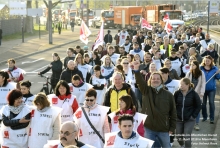‘Best deal in years’: 2.3 million public workers get pay rise after weeks of strikes led by German PSI affiliate Ver.di

Rolling public services strikes over recent weeks have hit public transport, hospitals, childcare facilities and administrative offices up and down the country, as over 220,000 of Germany’s 2.3 million public employees went on strike for better pay.
Early on Wednesday morning, Ver.di was able to show that the industrial action had paid off as it announced an agreement with the government for a new wage deal to last until March 2020.
The deal includes three pay rises over a 30-month period and will be retroactive from March 1st 2018.
The first stage of the pay rise will be a 3.19 percent wage increase lasting until April 2019, followed by a 3.09 percent increase until March 2020, when a further 1.06 percent will be added onto wages.
Additionally, state employees such as bin men who are on lower wages will receive a one-off payment of €250.
The deal will cost local governments €7.5 billion in extra salary payments, while the federal government will have to find room in its budget for an additional €2.2 billion.
'Very satisfied'
“This is the best result we have had in years,” Ver.di boss Frank Bsirske said of the result of the negotiations.
Interior Minister Horst Seehofer, who led the negotiations for the government, said he was “very satisfied” that public workers would receive a tangible pay boost while pay grades had also been reformed.
Thomas Böhle, who led the negotiations for local government, said that higher pay had been agreed upon for the top pay grades - meaning state jobs would become more attractive for specialists such as IT experts.
Local governments had been reluctant to sanction a pay increase for lower wage employees, saying that they did not face difficulties filling these positions. They were much keener to reform the higher pay grades, where they compete against the private sector for highly qualified staff.
(with info from Ver.di and thelocal.de)

